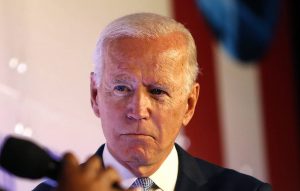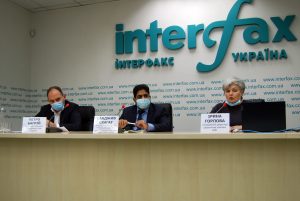
Ukraine together with France will produce high-rise elevators for fire trucks, Interior Minister Arsen Avakov said during the signing of the Memorandum of Understanding between the State Emergency Service of Ukraine and the French company Echelles Riffaud. According to the press service of the Ministry of Internal Affairs of Ukraine on Tuesday, the document was signed by the head of the State Emergency Service Mykola Chechotkin, General Director of Echelles Riffaud Benjamin Coustillier and export director of the company Mark Larov.
According to Avakov, a critical situation has developed in the fire and rescue units with modern technical means to extinguish fires and rescue people from high-rise buildings. The minister said that the existing equipment has been in operation for more than 40 years, and 90% of it have already worked out all the established terms of operation.
“Unfortunately, Ukraine has not produced and does not produce such equipment. Therefore, the Ministry of Internal Affairs, together with French partners, agreed on the production of modern firefighting equipment for Ukrainian rescuers,” the Minister of Internal Affairs said.
In particular, we are talking about the production of complexes with lifts up to 33 and 42 meters.
“However, an important aspect of bilateral cooperation is the condition when French-made cars will be assembled at Ukrainian factories. In addition, our specialists will be trained by their French colleagues,” the minister said.

Charge d’Affaires of the United States in Ukraine Kristina Kvien expressed confidence that a telephone conversation between U.S. President Joe Biden and Ukrainian President Volodymyr Zelensky will take place.
“Secretary Blinken’s remarks confirm that Ukraine will be a high priority for the administration and there’s no doubt that a call between President Biden and President Zelensky will happen,” Kvien said in an interview with Interfax-Ukraine.
In turn, Deputy Political Counselor Lynette Behnke pointed out that the U.S. Embassy in Ukraine hopes that both presidents will be able to talk directly, that it is essential to recall that, nevertheless, much has been achieved at other levels, somewhat below the level of the leaders of the countries.
“In early February, very early in this administration, Secretary Blinken spoke to his counterpart, Foreign Minister Kuleba. Defense Minister Taran has spoken with Defense Secretary Austin. Head of the Presidential Office Yermak spoke to National Security Advisor Sullivan. Other senior officials will connect in the near future. And every day at Embassy Kyiv we are working together with our Ukrainian counterparts on our common priorities,” she explained.
Behnke noted that both the White House and Secretary of State Blinken have repeatedly stressed the United States’ commitment to supporting Ukraine’s sovereignty and territorial integrity.
“The Secretary made a very strong statement supporting Ukraine on the 7th anniversary of the purported annexation of Crimea. He made a special video to underline his personal commitment. The Biden administration has wholeheartedly welcomed Ukraine’s Crimean Platform initiative,” she added.
“Meanwhile, our security and development assistance continues unabated. To give a concrete example, we announced another tranche of $125 million in security assistance on March 5,” Behnke said.

The Antimonopoly Committee of Ukraine has imposed a fine of UAH 4.7 billion on the operators of the filling station network, which are part of the Privat Group, for anticompetitive concerted actions in setting prices for petroleum products.
According to the committee’s statement on Tuesday evening, in particular, a fine was imposed on PTF Avias LLC, Trading House Avias LLC, Prom Garant Plus LLC, Alliance Evolution LLC, PJSC Ukrtatnafta and 169 filling station operators (including PJSC Ukrnafta).
The committee said that within the framework of the case opened in 2016, it was established that in the field of retail trade in light petroleum products in Ukraine, there is a system of cashless payments with scratch cards and Avias fuel cards. About 1,625 filling stations take part in this project, which operate under different brands in all regions of Ukraine, occupying a 25% share of all filling stations in the country.
“The committee determined that the Avias project is organized, coordinated and operates with the aim of harmonizing the price and trading behavior of the participants,” the committee said.
In particular, Keropur®ENERGY gasoline and diesel fuel were sold throughout the network, the same prices were set at a time regardless of the brand of the filling station and the region, and there was also a “center” that included several business entities located at the same address in the city of Dnipro, where detailed planning and coordination of network activities was performed.
In addition, the committee found a significant number of standard, basically identical contracts for the sale and purchase of petroleum products and property, lease of filling stations and financial assistance, and also established that individuals, who held the positions of director, founder, signatory, accountant, manager, etc, often changed each other and worked simultaneously in several companies participating in the project.
In addition, the composition of legal entities – participants in the project was constantly changing (without changing the personal composition). This happened through the same liquidators and at similar addresses of the latest registration in Kharkiv.
The committee found that filling station operators, including Ukrnafta, purchased light oil products from Ukrtatnafta at prices higher than similar imported fuel.
“Such coordinated behavior of the Avias project participants violates competition between operators of filling stations in the market. Therefore, prices for light oil products in the Avias network were set in anti-competitive conditions. Taking this into account, the committee approved to impose fines on the above-mentioned business entities in the total amount of UAH 4.7 billion for these violations,” the committee said.
“Today we are summarizing the result of a great deal of work and many years of legal confrontation between the Antimonopoly Committee and the participants in conspiracy on the Ukrainian fuel market. Despite complicated circumstances and enormous resistance from the defendants, we completed the investigation and made the decision,” Chair of the committee Olha Pischanska said after the meeting.

Ukraine needs more transparency and an improved business climate to move towards membership in European and Euro-Atlantic institutions, U.S. Charge d’Affaires in Ukraine Kristina Kvien has said.
“To help Ukraine move towards membership in European and Euro-Atlantic institutions, Ukraine needs more transparency, less corruption, and a better business environment. Ukraine’s commitments under IMF, World Bank and EU financial assistance programs provide valuable roadmaps to follow. Changes in these areas will help Ukraine become the modern, Western country the Ukrainian people aspire to,” Kvien said in an exclusive interview with Interfax-Ukraine.
When asked what the expectations of the United States from Ukraine in terms of reforms are, she pointed out that in fact such a wording is not appropriate, since the United States is working with Ukraine to help it build an economy for its own needs, so that it works for the benefit of the Ukrainian people and could realize their own aspirations.
“This is a win-win situation. Because a prosperous, secure, peaceful and democratic Ukraine will strengthen Europe and be a strong U. S. partner,” Kvien stressed.
At the same time, the U.S. Charge d’Affaires noted that one of the achievements is the land reform, which is expected to be implemented this summer, creating for the first time a land market that will help unleash Ukraine’s huge agricultural potential.
“Parliament is also looking at a draft law right now that will ensure transparency in the future land market and provide financial assistance to Ukrainian farmers. That would be a important achievement on top of what has already been done in land reform,” she said.
Kvien noted that decentralization is another key reform, as local governments, for the first time, have been given the authority to allocate budgets in line with local priorities.
“Decentralization is another key reform—because for the first time local governments have the power to allocate budgets in line with local priorities. And a success that is on the way, it seems, is passage of a package of privatization bills. If it passes, it will lead to a more transparent and fair privatization process for state-owned firms, which could create a wave of foreign investment, help modernize these firms, and employ thousands of Ukrainians. These are all important achievements on the economic front,” she said.

The Cabinet of Ministers of Ukraine intends to terminate the agreement with the government of the Russian Federation on cooperation in the field of tourism.
The corresponding draft decision was published in the agenda of the government meeting on Wednesday.
This agreement was signed in Kyiv on July 16, 1999.
It is noted that this decision will be made due to the fact that due to Russia’s armed aggression against Ukraine, actual cooperation in this area has been suspended, and there are no prospects for establishing such cooperation in the future.

The market for medicinal products of Ukrainian pharmaceutical manufacturers in 2020 expanded by 13% compared to 2019 and amounted to UAH 41 billion, President of the Association Manufacturers of Medications of Ukraine (AMMU) Petro Bahriy said at a press conference at Interfax-Ukraine on Tuesday.
“In 2020, the market share of domestic manufacturers has grown. The entire market of Ukrainian medicines was UAH 41 billion. It grew by almost 13% compared to the previous year. Exports also grew by 7%,” he said.
According to Bahriy, in 2020, the consumption of cold-relief medicines, medicines for digestive disorders and drugs that are used in the hospital segment decreased due to a decline in planned operations. At the same time, the COVID-19 group of drugs expanded.
In turn, Director General of the SMD analytical company Iryna Horlova said that as of the end of 2020, the entire volume of the pharmaceuticals market amounted to $2.2 billion in purchase prices excluding VAT.
According to the expert, 2020 brought more growth in monetary terms than the total cumulative growth over the previous five years: on average, the market for the previous five years showed a rise of 8%, this year a rise of 13% precisely due to the active participation of the state. At the same time, there is a significant decline in prices.
“The state had the largest share of purchases (28%). The state-funded market shows an increase of 92%, with almost $600 million. Among state-funded segments, the most successful and interesting is the work of the procurement agency Medical Procurement of Ukraine, which at the end of the year had 8% of the share of procurements and partially supplies of all medicines. The Ministry of Health held tenders for a total of $330 million, of which $170 million was the procurement of medicines,” she said, adding that the volume of procurement was also increased by medical institutions.
Horlova said that the retail segment has practically stagnated.
In addition, in 2020 significantly fewer new products entered the market, while 93% of them entered the state-funded segment “because the companies responded to the request,” the expert said.
She predicts that under an optimistic scenario in 2021 there will be growth, in particular in the budget-funded segment, but not so active, and retail will still be close to zero.
“In the next five years, most likely the Rx segment will occupy a fairly large share (77-79%). The share of the local manufacturers will grow to 36-38%. Of course, we cannot rule out a pessimistic scenario associated with a further recession and lockdown,” Horlova said.
At the same time, according to Manager of the Health Care Committee of the European Business Association (EBA) Dmytro Lurye, such an increase in the state-funded share is not enough.
“I want to note the growth of the state’s share. But this is still far from the indicators in the EU countries, in the reference countries, because the state’s share of procurement or reimbursement is 70-75%,” he said.
Lurye added that international manufacturers are urging the state to create a strategy and further develop the reimbursement program. When creating a strategy, it is necessary to identify priority areas for the further expansion of the program and, in general, an understanding of how it will develop.
At the same time, Deputy President of the Indian Pharmaceutical Manufacturers Association (IPMA), President of Euro Lifecare Private Limited Sanjeev Bhagat said that the government needs to stabilize the market.
“In 2020, government procurement grew significantly. In 2021, the state should invest in this market at the same pace to stabilize it,” he said.
In turn, Strategic Development Manager (Healthcare and Official Service Providers) of the American Chamber of Commerce in Ukraine Natalia Kravchenko noted the growth of electronic trade in medicines.
“We see some shifts in the regulation of this area. Development prospects include the importance of improving the regulatory system (GMP certification), simplifying the registration of medicines, which can positively impact the entry of international manufacturers into the market, and expanding the list of INNs that are reimbursed by the state,” she said.
The experts called for mutual recognition with the EU of the results of inspections of good manufacturing practice (GMP) in the production of pharmaceuticals. In addition, they emphasized the need to bring the production of vaccines, in particular against COVID-19, in Ukraine, as well as other drugs.
“Ukrainian pharma deals with this issue, and we are convinced that the presence of a domestic manufacturer is a matter of national security, including the production of vaccines. The easiest way is to transfer technologies from well-known companies and bring production into Ukraine. Farmak, Lekhim and other companies are in talks, and I hope there will be results by the end of the year. Negotiations are underway on other product groups,” Bahriy said.
Bhagat, for his part, added that Ukraine needs to cooperate on this issue with global manufacturers, in particular Indian ones.